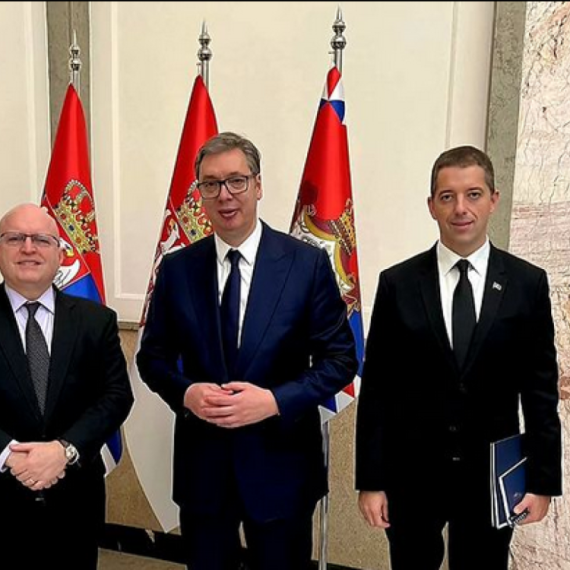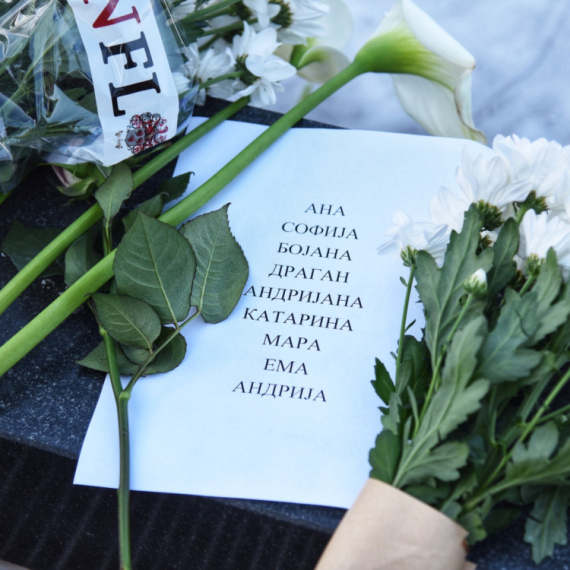Britain rejects bid to change EU treaty
A bid to change the EU treaty, which should help resolve the eurozone debt crisis, has not been reached at a summit in Brussels.
Friday, 09.12.2011.
13:24

A bid to change the EU treaty, which should help resolve the eurozone debt crisis, has not been reached at a summit in Brussels. The Franco-German plan met a strong resistance by Great Britain and Hungary so the decision will only apply to 17 eurozone members and possibly six other EU states. Britain rejects bid to change EU treaty French President Nicolas Sarkozy said after the meeting that the eurozone members needed to confirm the changes to the EU Treaty by March. The plan is based on a higher control of individual governments by the EU, including sanctioning violations of budget discipline and harmonization of tax rates. Some of the EU members that are not a part of the eurozone did not accept the plan. Great Britain and Hungary voted against it while Swedish and Czech prime ministers requested to consult with their parliaments. Poland, Bulgaria, Romania, Estonia, Latvia and Lithuania were ready to accept the agreement. Key EU leaders, German Chancellor Angela Merkel, British Prime Minister David Cameron and Sarkozy, held a separate meeting but failed to reach an agreement. “I am glad we did not join the eurozone and I can tell you now – Britain will never accept euro,” Cameron told reporters. The agreement on fiscal discipline is believed to be the first, key step before the European Central Bank (ECB), International Monetary Fund (IMF) and others agree to increase financial aid to countries with high debts such as Italy and Spain. ECB President Mario Draghi has welcomed the agreement and said that it represents a step toward stricter budget regulations, adding they are necessary if the eurozone wants to find its way out of the crisis. “We have always said that we will include 17 countries in the project if we cannot get all 27,” an EU diplomat said in Brussels. Swedish Prime Minister Fredrik Reinfeldt said after the meeting that his country probably would not join the agreement. “It would be very odd to sign an agreement that treats us as if we were a eurozone country. That has never been our goal,” he told AP. European Council President Herman Van Rompuy said that the states would according to the agreement secure additional EUR 200bn for the IMF. Sarkozy and Cameron in Brussels today (Tanjug)
Britain rejects bid to change EU treaty
French President Nicolas Sarkozy said after the meeting that the eurozone members needed to confirm the changes to the EU Treaty by March.The plan is based on a higher control of individual governments by the EU, including sanctioning violations of budget discipline and harmonization of tax rates.
Some of the EU members that are not a part of the eurozone did not accept the plan. Great Britain and Hungary voted against it while Swedish and Czech prime ministers requested to consult with their parliaments. Poland, Bulgaria, Romania, Estonia, Latvia and Lithuania were ready to accept the agreement.
Key EU leaders, German Chancellor Angela Merkel, British Prime Minister David Cameron and Sarkozy, held a separate meeting but failed to reach an agreement.
“I am glad we did not join the eurozone and I can tell you now – Britain will never accept euro,” Cameron told reporters.
The agreement on fiscal discipline is believed to be the first, key step before the European Central Bank (ECB), International Monetary Fund (IMF) and others agree to increase financial aid to countries with high debts such as Italy and Spain.
ECB President Mario Draghi has welcomed the agreement and said that it represents a step toward stricter budget regulations, adding they are necessary if the eurozone wants to find its way out of the crisis.
“We have always said that we will include 17 countries in the project if we cannot get all 27,” an EU diplomat said in Brussels.
Swedish Prime Minister Fredrik Reinfeldt said after the meeting that his country probably would not join the agreement.
“It would be very odd to sign an agreement that treats us as if we were a eurozone country. That has never been our goal,” he told AP.
European Council President Herman Van Rompuy said that the states would according to the agreement secure additional EUR 200bn for the IMF.

















































Komentari 7
Pogledaj komentare